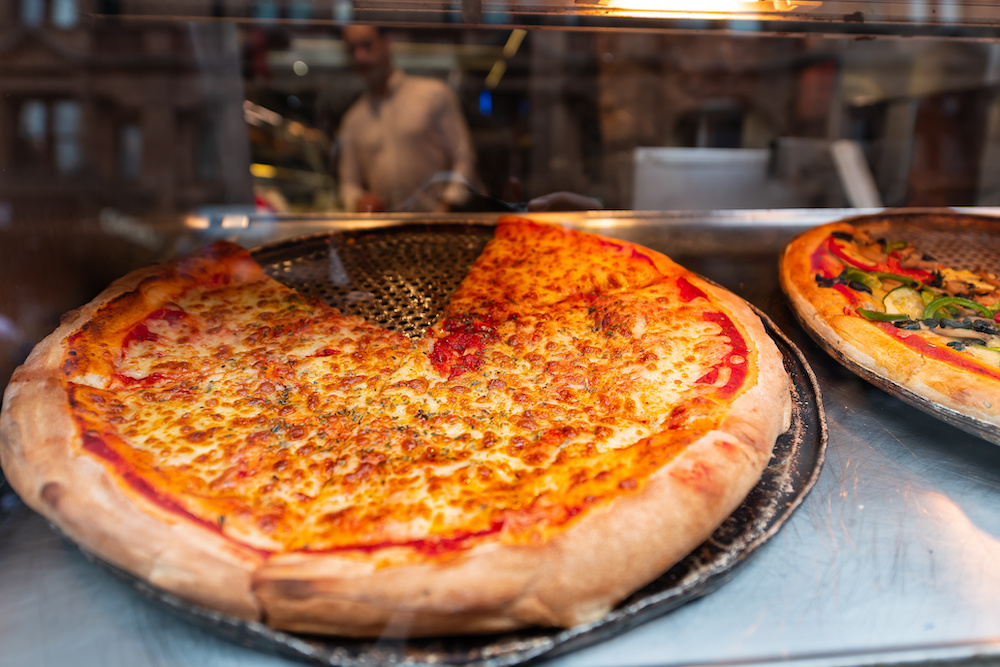Pizza math: For the best price, you should always order the biggest pie

- While ordering a smaller pizza is cheaper, it is likely not the most cost-effective option.
- An informal study overviewed the average price per square inch of pizza at restaurants across the U.S.
- Thanks to some simple math, it becomes clear that ordering the largest pizza almost always gets you the best price per square inch.
Quick: How much bigger is a 16-inch pizza than an 8-inch pizza?
If you answered twice the size, we may need to send you in for some remedial math. A 16-inch pizza is four times the size of the 8-inch pizza. Size matters. An extensive study conducted by NPR examined the prices from 3,678 pizza joints throughout the U.S., using data from Grubhub Seamless. After calculating the price per square inch of various pizza options, the results revealed this potentially counterintuitive conclusion:
You should always order the large pizza because it will be cheaper per square inch.
While a 16-inch pizza is four times the size of the 8-inch pizza, the larger pizza will be far less than four times the price of the small. Although we obviously expect a discount per unit (square inch for pizza in this case), our difficulty with quickly understanding the size difference may make the price differences seem less extreme than it truly is. (I break down the prices at Pizza Hut later in this article.)
Judging the value we get per unit is not always clear just from our eyes — that’s why grocery stores typically provide a price-per-unit for consumers.

The size of a pizza pie
In order to figure out the size of a pizza pie, you literally have to use π (pi) in the calculation. If it has been awhile since you sat in an uncomfortable seat with a #2 pencil, π is equal to approximately 3.14159. The calculation for the area of the pizza is πr2. R, the radius, is half the diameter.
16-inch pizza:
r (radius)=8 inches
Calculation: 3.14159 * (8 squared) = 201.06176
8-inch pizza:
r (radius)=4inches
Calculation: 3.14159 * (4 squared) = 50.26544

The price of pizza at Pizza Hut
While the NPR study looked at more than 3,000 pizza places to crunch the average price per square inch of pizza, it can be helpful to look at just one popular eatery: Pizza Hut. Pizza Hut serves three sizes: personal pan, medium, and large. (Note: Actual prices may vary.)
A personal pan at Pizza Hut is 6 inches in diameter and costs $4.50.
r (radius) = 3 inches
Size calculation: 3.14159 * (3 squared) = 28.27431
Price per square inch of pizza = $4.50/28.27431 = 15.92 cents per square inch
A medium pizza at Pizza Hut is 12 inches in diameter and costs $9.99.
r (radius) = 6 inches
Size Calculation: 3.14159 * (6 squared) = 113.09724
Price per square inch of pizza = $9.99/113.09724 = 8.83 cents per square inch of pizza
A large pizza at Pizza Hut is 14 inches in diameter and costs $11.99.
r (radius) = 7 inches
Size Calculation: 3.14159 * (7 squared) = 153.93791
Price per square inch of pizza = $11.99/153.93791 = 7.79 cents per square inch of pizza
In short: pizza + math = delicious deal
This article was originally published April 11, 2017. It was updated in January 2022.





